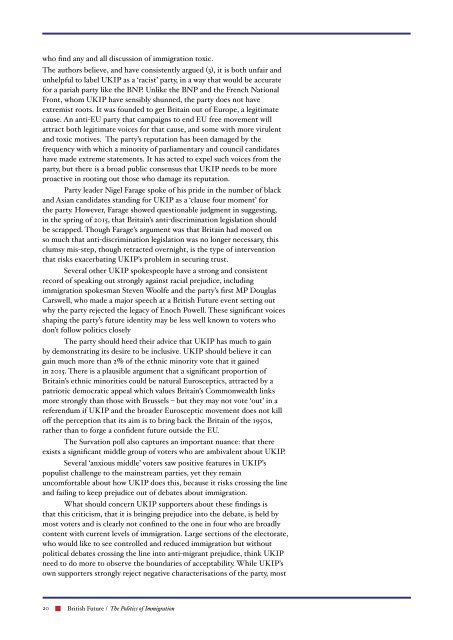THE POLITICS OF IMMIGRATION
The-politics-of-immigration
The-politics-of-immigration
You also want an ePaper? Increase the reach of your titles
YUMPU automatically turns print PDFs into web optimized ePapers that Google loves.
who find any and all discussion of immigration toxic.<br />
The authors believe, and have consistently argued (3), it is both unfair and<br />
unhelpful to label UKIP as a ‘racist’ party, in a way that would be accurate<br />
for a pariah party like the BNP. Unlike the BNP and the French National<br />
Front, whom UKIP have sensibly shunned, the party does not have<br />
extremist roots. It was founded to get Britain out of Europe, a legitimate<br />
cause. An anti-EU party that campaigns to end EU free movement will<br />
attract both legitimate voices for that cause, and some with more virulent<br />
and toxic motives. The party’s reputation has been damaged by the<br />
frequency with which a minority of parliamentary and council candidates<br />
have made extreme statements. It has acted to expel such voices from the<br />
party, but there is a broad public consensus that UKIP needs to be more<br />
proactive in rooting out those who damage its reputation.<br />
Party leader Nigel Farage spoke of his pride in the number of black<br />
and Asian candidates standing for UKIP as a ‘clause four moment’ for<br />
the party. However, Farage showed questionable judgment in suggesting,<br />
in the spring of 2015, that Britain’s anti-discrimination legislation should<br />
be scrapped. Though Farage’s argument was that Britain had moved on<br />
so much that anti-discrimination legislation was no longer necessary, this<br />
clumsy mis-step, though retracted overnight, is the type of intervention<br />
that risks exacerbating UKIP’s problem in securing trust.<br />
Several other UKIP spokespeople have a strong and consistent<br />
record of speaking out strongly against racial prejudice, including<br />
immigration spokesman Steven Woolfe and the party’s first MP Douglas<br />
Carswell, who made a major speech at a British Future event setting out<br />
why the party rejected the legacy of Enoch Powell. These significant voices<br />
shaping the party’s future identity may be less well known to voters who<br />
don’t follow politics closely<br />
The party should heed their advice that UKIP has much to gain<br />
by demonstrating its desire to be inclusive. UKIP should believe it can<br />
gain much more than 2% of the ethnic minority vote that it gained<br />
in 2015. There is a plausible argument that a significant proportion of<br />
Britain’s ethnic minorities could be natural Eurosceptics, attracted by a<br />
patriotic democratic appeal which values Britain’s Commonwealth links<br />
more strongly than those with Brussels – but they may not vote ‘out’ in a<br />
referendum if UKIP and the broader Eurosceptic movement does not kill<br />
off the perception that its aim is to bring back the Britain of the 1950s,<br />
rather than to forge a confident future outside the EU.<br />
The Survation poll also captures an important nuance: that there<br />
exists a significant middle group of voters who are ambivalent about UKIP.<br />
Several ‘anxious middle’ voters saw positive features in UKIP’s<br />
populist challenge to the mainstream parties, yet they remain<br />
uncomfortable about how UKIP does this, because it risks crossing the line<br />
and failing to keep prejudice out of debates about immigration.<br />
What should concern UKIP supporters about these findings is<br />
that this criticism, that it is bringing prejudice into the debate, is held by<br />
most voters and is clearly not confined to the one in four who are broadly<br />
content with current levels of immigration. Large sections of the electorate,<br />
who would like to see controlled and reduced immigration but without<br />
political debates crossing the line into anti-migrant prejudice, think UKIP<br />
need to do more to observe the boundaries of acceptability. While UKIP’s<br />
own supporters strongly reject negative characterisations of the party, most<br />
20 British Future / The Politics of Immigration


